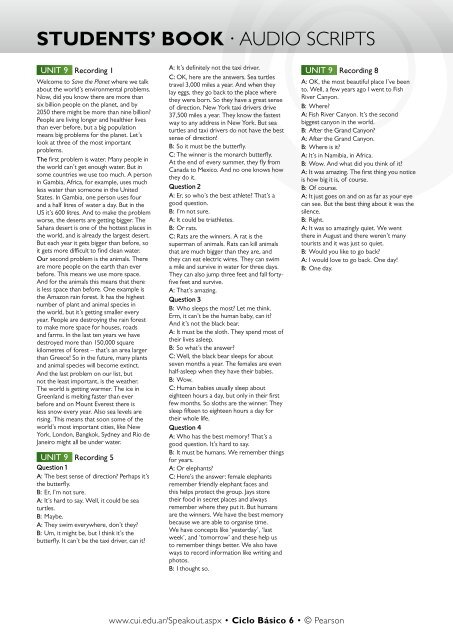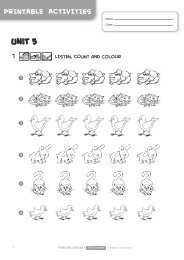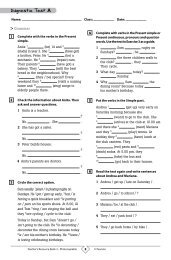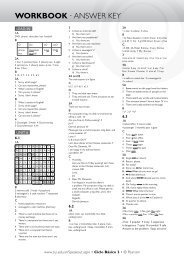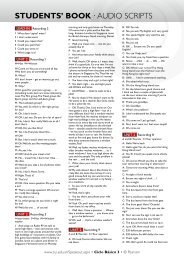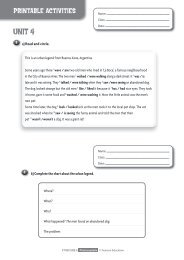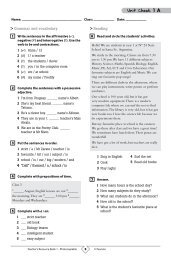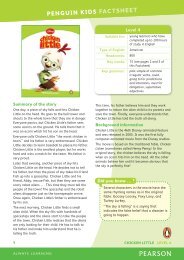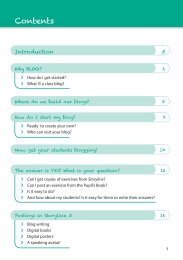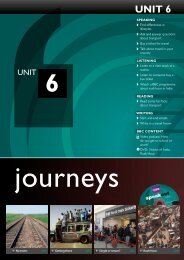STUDENTS' BOOK · AUDIO SCRIPTS - Pearson ELT
STUDENTS' BOOK · AUDIO SCRIPTS - Pearson ELT
STUDENTS' BOOK · AUDIO SCRIPTS - Pearson ELT
Create successful ePaper yourself
Turn your PDF publications into a flip-book with our unique Google optimized e-Paper software.
STUDENTS’ <strong>BOOK</strong> · <strong>AUDIO</strong> <strong>SCRIPTS</strong><br />
Unit 9 Recording 1<br />
Welcome to Save the Planet where we talk<br />
about the world’s environmental problems.<br />
Now, did you know there are more than<br />
six billion people on the planet, and by<br />
2050 there might be more than nine billion?<br />
People are living longer and healthier lives<br />
than ever before, but a big population<br />
means big problems for the planet. Let’s<br />
look at three of the most important<br />
problems.<br />
The first problem is water. Many people in<br />
the world can’t get enough water. But in<br />
some countries we use too much. A person<br />
in Gambia, Africa, for example, uses much<br />
less water than someone in the United<br />
States. In Gambia, one person uses four<br />
and a half litres of water a day. But in the<br />
US it’s 600 litres. And to make the problem<br />
worse, the deserts are getting bigger. The<br />
Sahara desert is one of the hottest places in<br />
the world, and is already the largest desert.<br />
But each year it gets bigger than before, so<br />
it gets more difficult to find clean water.<br />
Our second problem is the animals. There<br />
are more people on the earth than ever<br />
before. This means we use more space.<br />
And for the animals this means that there<br />
is less space than before. One example is<br />
the Amazon rain forest. It has the highest<br />
number of plant and animal species in<br />
the world, but it’s getting smaller every<br />
year. People are destroying the rain forest<br />
to make more space for houses, roads<br />
and farms. In the last ten years we have<br />
destroyed more than 150,000 square<br />
kilometres of forest – that’s an area larger<br />
than Greece! So in the future, many plants<br />
and animal species will become extinct.<br />
And the last problem on our list, but<br />
not the least important, is the weather.<br />
The world is getting warmer. The ice in<br />
Greenland is melting faster than ever<br />
before and on Mount Everest there is<br />
less snow every year. Also sea levels are<br />
rising. This means that soon some of the<br />
world’s most important cities, like New<br />
York, London, Bangkok, Sydney and Rio de<br />
Janeiro might all be under water.<br />
Unit 9 Recording 5<br />
Question 1<br />
A: The best sense of direction? Perhaps it’s<br />
the butterfly.<br />
B: Er, I’m not sure.<br />
A: It’s hard to say. Well, it could be sea<br />
turtles.<br />
B: Maybe.<br />
A: They swim everywhere, don’t they?<br />
B: Um, it might be, but I think it’s the<br />
butterfly. It can’t be the taxi driver, can it?<br />
A: It’s definitely not the taxi driver.<br />
C: OK, here are the answers. Sea turtles<br />
travel 3,000 miles a year. And when they<br />
lay eggs, they go back to the place where<br />
they were born. So they have a great sense<br />
of direction. New York taxi drivers drive<br />
37,500 miles a year. They know the fastest<br />
way to any address in New York. But sea<br />
turtles and taxi drivers do not have the best<br />
sense of direction!<br />
B: So it must be the butterfly.<br />
C: The winner is the monarch butterfly.<br />
At the end of every summer, they fly from<br />
Canada to Mexico. And no one knows how<br />
they do it.<br />
Question 2<br />
A: Er, so who’s the best athlete? That’s a<br />
good question.<br />
B: I’m not sure.<br />
A: It could be triathletes.<br />
B: Or rats.<br />
C: Rats are the winners. A rat is the<br />
superman of animals. Rats can kill animals<br />
that are much bigger than they are, and<br />
they can eat electric wires. They can swim<br />
a mile and survive in water for three days.<br />
They can also jump three feet and fall fortyfive<br />
feet and survive.<br />
A: That’s amazing.<br />
Question 3<br />
B: Who sleeps the most? Let me think.<br />
Erm, it can’t be the human baby, can it?<br />
And it’s not the black bear.<br />
A: It must be the sloth. They spend most of<br />
their lives asleep.<br />
B: So what’s the answer?<br />
C: Well, the black bear sleeps for about<br />
seven months a year. The females are even<br />
half-asleep when they have their babies.<br />
B: Wow.<br />
C: Human babies usually sleep about<br />
eighteen hours a day, but only in their first<br />
few months. So sloths are the winner. They<br />
sleep fifteen to eighteen hours a day for<br />
their whole life.<br />
Question 4<br />
A: Who has the best memory? That’s a<br />
good question. It’s hard to say.<br />
B: It must be humans. We remember things<br />
for years.<br />
A: Or elephants?<br />
C: Here’s the answer: female elephants<br />
remember friendly elephant faces and<br />
this helps protect the group. Jays store<br />
their food in secret places and always<br />
remember where they put it. But humans<br />
are the winners. We have the best memory<br />
because we are able to organise time.<br />
We have concepts like ‘yesterday’, ‘last<br />
week’, and ‘tomorrow’ and these help us<br />
to remember things better. We also have<br />
ways to record information like writing and<br />
photos.<br />
B: I thought so.<br />
Unit 9 Recording 8<br />
A: OK, the most beautiful place I’ve been<br />
to. Well, a few years ago I went to Fish<br />
River Canyon.<br />
B: Where?<br />
A: Fish River Canyon. It’s the second<br />
biggest canyon in the world.<br />
B: After the Grand Canyon?<br />
A: After the Grand Canyon.<br />
B: Where is it?<br />
A: It’s in Namibia, in Africa.<br />
B: Wow. And what did you think of it?<br />
A: It was amazing. The first thing you notice<br />
is how big it is, of course.<br />
B: Of course.<br />
A: It just goes on and on as far as your eye<br />
can see. But the best thing about it was the<br />
silence.<br />
B: Right.<br />
A: It was so amazingly quiet. We went<br />
there in August and there weren’t many<br />
tourists and it was just so quiet.<br />
B: Would you like to go back?<br />
A: I would love to go back. One day!<br />
B: One day.<br />
www.cui.edu.ar/Speakout.aspx • Ciclo Básico 6 • © <strong>Pearson</strong>
STUDENTS’ <strong>BOOK</strong> · <strong>AUDIO</strong> <strong>SCRIPTS</strong><br />
Unit 10 Recording 1<br />
Conversation 1<br />
I=Interviewer R=Rick<br />
I: Rick, you’ve lived in Dubai for … what,<br />
four years, right?<br />
R: Yeah, four years.<br />
I: So what’s it like, living in Dubai?<br />
R: Well, I read that Dubai is one of the<br />
world’s fastest growing cities, so there are<br />
a lot of people, and it’s very crowded. It’s a<br />
great city for shopping, and going out. And<br />
it has really good nightlife, with lots of bars<br />
and clubs.<br />
I: Is it a safe city?<br />
R: Yes, there isn’t a lot of crime. The<br />
streets are very safe. But one of the biggest<br />
problems is the traffic. Everyone drives<br />
a car here – petrol is still cheap, so the<br />
traffic’s terrible. One good thing is the taxis<br />
though. There are lots of them, and they’re<br />
cheap, so you don’t have to drive.<br />
Conversation 2<br />
I=Interviewer S=Sasha<br />
I: Sasha, you live in Tokyo, don’t you?<br />
S: That’s right.<br />
I: And, do you … do you like it? Do you<br />
like living in Tokyo?<br />
S: Yes, Tokyo is a great city to live in. People<br />
think it’s very expensive, but actually you<br />
can buy Japanese food in the supermarkets<br />
quite cheaply, and eating out in Japanese<br />
restaurants isn’t expensive either.<br />
I: How about getting around? What’s the<br />
public transport like?<br />
S: There’s a really good public transport<br />
system here. The metro system is fantastic.<br />
It’s very fast, and it’s cheap, so lots of<br />
people use it. That’s the only problem. It<br />
gets very crowded.<br />
I: And what do you like best about living<br />
in Tokyo?<br />
S: The food, definitely. I love Japanese<br />
food! And the green spaces. There are<br />
lots of parks and green spaces, so it’s less<br />
polluted than you think.<br />
Conversation 3<br />
I=Interviewer C=Charlie<br />
I: What about Sydney? What’s Sydney<br />
like, Charlie?<br />
C: Sydney is one of the best cities in the<br />
world. There are lots of young, friendly<br />
people living here, so there’s a really good<br />
atmosphere. The streets are clean and safe<br />
and there are lots of things to see and do.<br />
There are beautiful buildings, like the Opera<br />
House. You can sit and watch the boats on<br />
the harbour. And it has one of the most<br />
beautiful coastlines in the world.<br />
I: What’s the weather like? Is it really hot?<br />
C: The weather is perfect. It’s never<br />
too hot and never too cold. You can eat<br />
outside all year round, so there’s a great<br />
café culture with lots of places on the<br />
streets selling really good coffee.<br />
I: So, are there any problems?<br />
C: Problems? Not really. Traffic, I suppose.<br />
Too much traffic and a terrible public<br />
transport system.<br />
Unit 10 Recording 3<br />
Conversation 1<br />
G=Guest R=Receptionist<br />
G: Oh hello. Could you help me? There’s a<br />
problem with the air conditioning.<br />
R: Oh yes?<br />
G: I’ve just tried to switch it on, but it<br />
doesn’t work.<br />
R: Is it completely dead?<br />
G: Completely. Absolutely nothing.<br />
R: OK, we’ll look into it right away. I’ll send<br />
someone up. It’ll be about five minutes,<br />
OK?<br />
G: Thanks.<br />
R: You’re welcome. And sorry about that.<br />
Conversation 2<br />
W=Waitress D=Diner M=Manager<br />
D: I’m afraid I have a complaint. Could I<br />
speak to the manager, please?<br />
W: Yes, of course.<br />
M: Good evening, sir. I understand there’s a<br />
problem.<br />
D: Yes. I’m afraid I have a complaint.<br />
M: Oh?<br />
D: Well, we got here at eight. And then we<br />
waited about twenty minutes for a table.<br />
M: Right.<br />
D: This is for a table we’d booked for eight,<br />
OK? Then we waited another hour for our<br />
meal.<br />
M: Right.<br />
D: One hour. Then when the bill arrived<br />
they put this extra charge on it.<br />
M: An extra charge? That’s probably the<br />
service charge.<br />
D: Well, could you check this for me,<br />
please?<br />
M: Yes, that’s service.<br />
D: Well, to be honest, I don’t want to pay<br />
this.<br />
M: Of course not. Well, sir, I am really<br />
sorry about that. It’s a very busy time of<br />
year.<br />
Conversation 3<br />
W=Woman M=Man<br />
W: Excuse me. Do you work here?<br />
M: Yes.<br />
W: Do you know when the next train will<br />
be arriving? I mean, I’ve been here for over<br />
an hour.<br />
M: I’m sorry but there’s nothing we can do<br />
at the moment. Everything is delayed.<br />
W: And you don’t know when the next<br />
train is coming?<br />
M: No.<br />
W: Or why there’s a delay?<br />
M: Snow.<br />
W: What?<br />
M: Snow on the track. It was the wrong<br />
type of snow.<br />
W: What do you mean ‘the wrong type of<br />
snow’? You’re kidding, right?<br />
Unit 10 Recording 5<br />
www.cui.edu.ar/Speakout.aspx • Ciclo Básico 6 • © <strong>Pearson</strong><br />
A: One of the things that really annoys me<br />
is when I buy food in the supermarket, and<br />
I see that, for example, I buy apples, yeah,<br />
and here in the UK we grow a lot of apples.<br />
And I go to the supermarket to buy some<br />
apples, and they come from New Zealand,<br />
or South Africa, or something. And, I just<br />
think it’s crazy. I mean, I don’t understand<br />
why we pay for apples to come millions<br />
of kilometres, from the other side of the<br />
world, when we grow them right here in<br />
this country. It really makes me angry.<br />
B: I get very fed up with public transport,<br />
you know, buses and trains, and that kind<br />
of thing. I mean the government says that<br />
we shouldn’t use our cars, and we should<br />
travel by public transport. But it’s horrible.<br />
It’s crowded and there are delays. I use the<br />
train to get to work, and so many times I<br />
arrive late because the train gets cancelled,<br />
or delayed, and you know I’m paying a lot<br />
of money for my ticket, so I just think it<br />
should be better. I think the service should<br />
be better.
STUDENTS’ <strong>BOOK</strong> · <strong>AUDIO</strong> <strong>SCRIPTS</strong><br />
Unit 11 Recording 1<br />
1 I use my phone for everything. I text<br />
most of the time because it’s quick<br />
and cheap, so I text my friends and my<br />
boyfriend. We send each other texts during<br />
the day. It’s a nice way to keep in touch. I<br />
like texts because they are quiet – nobody<br />
knows what you are saying. My mum used<br />
to call me all the time to check that I’m OK,<br />
but now she can text me, which is much<br />
better. I get really annoyed when you’re<br />
talking to someone though, and they are<br />
texting someone else. I think that’s really<br />
rude.<br />
2 I use the internet a lot now. I use it for<br />
phone calls – you know – what’s it called …<br />
Skype. I use Skype to keep in touch with my<br />
family because my daughter lives in France<br />
you see, so I don’t see her very often and<br />
the phone is expensive. With the internet I<br />
can see my grandchildren – it’s wonderful.<br />
My son sets up the computer for me. I<br />
haven’t learnt how to do that yet. And<br />
sometimes it crashes during the phone call,<br />
which is annoying, or I can’t see the picture<br />
properly. But usually it’s fine. Generally, I<br />
think the technology is wonderful. When<br />
I was younger we only dreamed of having<br />
video phone calls, but now it’s possible and<br />
it’s free.<br />
3 We use a blog. We’ve never done it<br />
before, but it’s a great way to tell people<br />
about your travel experiences. We’ve been<br />
to so many places already and it’s nice to<br />
be able to tell people about them. And you<br />
can put photos there of the people you<br />
meet and the places you visit. It’s better<br />
than writing postcards because you don’t<br />
have to wait for them to arrive. As soon<br />
as you write the blog, people all over the<br />
world can read it. And you only have to<br />
write it once! The only problem we have is<br />
when we can’t find an internet café.<br />
4 I’ve just started to use networking sites,<br />
like Facebook and MySpace. They’re a<br />
great way to keep in touch with people<br />
you don’t see very often. You can post<br />
photos or send jokes and funny videos. I<br />
found some friends I haven’t seen for years<br />
and it was great to see their pages. The<br />
only problem is that I keep looking at the<br />
website when I should be working.<br />
Unit 11 Recording 3<br />
A: I use the internet all day at work. I ‘wilf ’<br />
and I get my work done.<br />
B: Yeah, me too.<br />
A: I’m sorry, but I really don’t see what the<br />
problem is.<br />
C: I think the problem is that lots of<br />
workers spend all day on the internet<br />
instead of doing their work.<br />
A: Hmm.<br />
C: And students at university are failing<br />
their degrees because they spend all their<br />
time checking Facebook and watching the<br />
videos that friends send them.<br />
B: Yes, that’s true, but … um … I don’t<br />
think, you know, I don’t think that the<br />
problem is the internet. You know, I think<br />
the problem is with the websites like<br />
Facebook.<br />
A: Yeah, MySpace …<br />
B: Some companies stop you from using<br />
certain websites. And I think that’s OK.<br />
C: But it’s such a waste of time. I don’t<br />
think people should use the internet at<br />
work, unless you need it for your work.<br />
A: I’m not sure about that. Using the<br />
internet helps to give you a break. It’s<br />
like having a cup of coffee or talking to<br />
someone in the office. People should use<br />
the internet as much as they like.<br />
B: Yes, that’s right. I think it’s good to use<br />
the internet. I run a small business and all<br />
my staff use the internet as much as they<br />
want to. I don’t check what they are doing.<br />
They do all their work and they are happy. I<br />
don’t think it’s a waste of time at all. It’s the<br />
same as going to a bookshop …<br />
C: No, but …<br />
B: or looking through a pile of magazines.<br />
C: I’m afraid I totally disagree. The problem<br />
is that people are addicts. People aren’t<br />
addicted to reading books, but the internet<br />
is different. People spend too much time<br />
in front of the computer. They choose the<br />
internet over sports and going out. They<br />
forget how to live in the real world, and<br />
‘wilfing’ is a part of that.<br />
Unit 11 Recording 6<br />
1 OK – mobile phone? That’s essential. I<br />
love it. I use it all the time. I love talking to<br />
people, and texting. I couldn’t live without<br />
my mobile. MP3 player? I suppose it’s not<br />
essential, although I do like listening to<br />
music. Television? Not essential. I don’t<br />
watch much television. Digital camera?<br />
Not essential. I’m terrible at taking photos<br />
anyway. So, what’s left? Er … laptop? That’s<br />
essential really. I use my laptop for work, so<br />
yes, I need that.<br />
2 Which are essential? All of them!<br />
Goodness. Right. Mobile phone? Essential.<br />
I don’t go anywhere without my phone.<br />
I need it in case there’s an emergency<br />
and I have to call someone. Or if there’s<br />
a problem with one of the children. Yes,<br />
I definitely need my phone. TV? That’s<br />
essential really. I couldn’t live without my<br />
television and DVD player. Umm. Laptop?<br />
Well, I need a computer to go on the<br />
internet and keep in touch with people. So,<br />
that’s essential. Digital camera? I suppose I<br />
don’t need that. Someone else can take the<br />
photos! What else? MP3 player. No. I can<br />
live without that.<br />
www.cui.edu.ar/Speakout.aspx • Ciclo Básico 6 • © <strong>Pearson</strong>
WORK<strong>BOOK</strong> · <strong>AUDIO</strong> <strong>SCRIPTS</strong><br />
Unit 9 Recording 1<br />
bigger than<br />
smaller than<br />
higher than<br />
colder than<br />
hotter than<br />
Unit 9 Recording 2<br />
1 big ... bigger ... bigger than ... The<br />
population in France is bigger than the<br />
population in Poland.<br />
2 small ... smaller ... smaller than ... France<br />
is smaller than Poland.<br />
3 high ... higher ... higher than ... Mont<br />
Blanc, in France, is higher than Rysy in<br />
Poland.<br />
4 cold ... colder ... colder than ... In<br />
January it is colder in Poland than in<br />
France.<br />
5 hot ... hotter ... hotter than ... In July it is<br />
hotter in France than in Poland.<br />
Unit 9 Recording 3<br />
1 I’m lucky living by the sea. Every<br />
morning I see fishermen coming in after<br />
work. There’s always something to<br />
do because the sea is always different.<br />
Every day you see something different.<br />
When I was younger we used to have<br />
parties and sleep on the beach. We<br />
cooked fish and listened to Bob Marley,<br />
and that was fun. These days I still<br />
go for walks every day with my dog.<br />
We’ve seen dolphins here. And we<br />
saw a dead whale on the beach once. It<br />
was enormous. It was on the beach for<br />
weeks.<br />
2 As a child I played in a tree house in<br />
the garden. We were always outside.<br />
We invented games and we knew<br />
the names of animals and insects. We<br />
played in our garden or in our friends’<br />
gardens. It was very safe in those days.<br />
You could be outside all day. When I<br />
was young we didn’t have computers or<br />
even the television. And there wasn’t as<br />
much crime, so we really grew up in the<br />
garden.<br />
3 I go hiking and camping in the<br />
mountains. You can do that here in the<br />
summer. In the winter it’s too cold. I<br />
think Americans like me enjoy the wild.<br />
We like big spaces, big skies. I’m just a<br />
few miles from a city but there are all<br />
kinds of plants and animals out here.<br />
You can see deer and bears. It’s pretty<br />
amazing.<br />
4 I work with animals all the time. We<br />
have chickens, cows and pigs on the<br />
farm. There are a lot of farms around<br />
here, so it’s completely normal to see<br />
animals around. I really like feeding the<br />
pigs ’cause they’re quite funny to watch.<br />
One thing I don’t like is getting up early.<br />
We do it every day. We get up at five in<br />
the morning and I’m always half asleep.<br />
Unit 10 Recording 1<br />
Conversation 1<br />
A: What’s your new teacher like?<br />
B: She’s really good. She makes the lessons<br />
interesting.<br />
Conversation 2<br />
A: What’s it like living in the country?<br />
B: It’s a bit quiet. I think I preferred the<br />
city.<br />
Conversation 3<br />
A: Does your mother like staying with you?<br />
B: She loves it. She comes to stay once a<br />
month.<br />
Conversation 4<br />
A: Do you like eating out in restaurants?<br />
B: I enjoy it sometimes, but I prefer to<br />
cook at home.<br />
Conversation 5<br />
A: Is it much more expensive to live there<br />
now? What are the prices like?<br />
B: It’s not too bad. But it’s more expensive<br />
than it was.<br />
Conversation 6<br />
A: Does your brother like it in Scotland?<br />
B: He likes it a lot. He says it’s beautiful.<br />
Conversation 7<br />
A: What’s your new job like? Are you<br />
enjoying it?<br />
B: It’s brilliant. The people I work with are<br />
really friendly.<br />
Unit 10 Recording 2<br />
1 What’s your new teacher like?<br />
2 What’s it like living in the country?<br />
3 Does your mother like staying with you?<br />
4 Do you like eating out in restaurants?<br />
5 What are the prices like?<br />
6 Does your brother like it in Scotland?<br />
7 What’s your new job like?<br />
Unit 10 Recording 3<br />
Conversation 1<br />
S = Sophie I = Interviewer<br />
S: OK. Right. My name is Sophie Dunston<br />
and I’m sixteen years old. Well, one<br />
thing I don’t like is people using their<br />
mobile phones or laptops or other<br />
technology at the wrong time.<br />
I: What do you mean by the wrong time?<br />
S: For example, during lessons. Or any<br />
time when someone’s trying to talk to<br />
them.<br />
I: Isn’t this normal now?<br />
S: I don’t think so. Some of my friends<br />
don’t even hear their parents because<br />
they spend their whole life wearing<br />
headphones. I think it’s really rude.<br />
I: And how would you stop this?<br />
S: Well, in my school they banned<br />
personal technology during lessons and<br />
I think it was a really good idea. People<br />
can concentrate much better now.<br />
Conversation 2<br />
I = Interviewer L = Luis<br />
I: Luis, can you just introduce yourself<br />
briefly?<br />
L: Yeah, I’m thirty-five years old and I’m a<br />
waiter. Shall I answer the questions?<br />
I: Yes, go ahead.<br />
L: OK. Well, for me the worst thing is<br />
litter.<br />
I: On the street?<br />
L: Litter on the street. People just throw<br />
away bits of paper or drop food. But it’s<br />
also on the tube. I’m a Londoner. I go<br />
to work every day by tube and people<br />
just leave their newspapers lying around.<br />
And all this paper is a real mess.<br />
I: How can we stop it?<br />
L: I don’t think you can stop it. The<br />
government has tried to introduce fines<br />
but it hasn’t worked.<br />
I: What punishment would you suggest<br />
for people who drop litter?<br />
L: I’d make them clean the streets.<br />
Conversation 3<br />
I = Interviewer P = Pamela<br />
I: If you just give your name and age ...<br />
P: Alright. My name is Pamela and I’m<br />
seventy years old. But I think I’m a<br />
young seventy. Unlike most of my older<br />
friends, I love technology and I use<br />
email every day. But the one thing I hate<br />
about it is spam. It is so annoying. I think<br />
the people who are responsible should<br />
be forced to sit down and read millions<br />
of spam messages for six months.<br />
I: That would teach them ...<br />
P: Of course it would.<br />
Unit 10 Recording 4<br />
1 There’s a problem with my room.<br />
2 Excuse me.<br />
3 Could I speak to the manager?<br />
4 Could you help me?<br />
5 I’m afraid I have a problem.<br />
6 I have to make a complaint.<br />
www.cui.edu.ar/Speakout.aspx • Ciclo Básico 6 • © <strong>Pearson</strong>
WORK<strong>BOOK</strong> · <strong>AUDIO</strong> <strong>SCRIPTS</strong><br />
Unit 11 Recording 1<br />
Conversation 1<br />
A: Have you finished the book yet?<br />
B: Yes, I’ve already started the next one.<br />
Conversation 2<br />
A: Have you cooked the dinner yet?<br />
B: No, I’ve only just got home.<br />
Conversation 3<br />
A: Have you asked your wife yet?<br />
B: No, I’m going to speak to her later.<br />
Conversation 4<br />
A: Have you decided where we’re going<br />
yet?<br />
B: Yes, we’ve just booked a table at<br />
Mario’s.<br />
Conversation 5<br />
A: Do you want to come and play football?<br />
B: No, I’ve already played twice this week.<br />
Conversation 6<br />
A: Have you seen Miranda?<br />
B: Yes, she’s just left.<br />
Unit 11 Recording 2<br />
1 I get bored very easily. I prefer being<br />
busy, so I’m always doing things. Some<br />
people just like to sit down and do<br />
nothing. But I can’t do that. I need to be<br />
active.<br />
2 I feel lonely sometimes if my partner<br />
goes away for work and I’m on my own<br />
at home. But then I call a friend or my<br />
sister. Or I speak to someone who I<br />
haven’t spoken to for a long time. Then<br />
I don’t feel lonely any more.<br />
3 I get really confused when I have to do<br />
anything with numbers, like check bills<br />
or bank rates and things like that. I hate<br />
that kind of thing. I do find numbers<br />
confusing.<br />
4 I am always amazed by nature. The<br />
beauty of nature. You can just stand in<br />
a beautiful place and look at it, and it’s<br />
just amazing.<br />
5 I get nervous when I have to organise<br />
a social event, like if I’m having a party<br />
or lots of people round to dinner. I get<br />
nervous about what I’m going to cook<br />
and if I’ll have time to do everything.<br />
6 I worry about all kinds of things. Often<br />
I feel worried about the world when<br />
I see the news and all the problems.<br />
There are so many problems in the<br />
world and a lot of the time I try not to<br />
think about them, and then suddenly, I’ll<br />
start to worry.<br />
Unit 11 Recording 3<br />
R = Robert M = Miriam<br />
R: I think they have already changed the<br />
way we live. I mean, a lot of people,<br />
like me, spend a lot of time playing on<br />
computer games. Some people already<br />
spend more time in virtual worlds,<br />
like Second Life, than they do in the<br />
real world. And I’m one of them. I’m<br />
starting to use Second Life at work too.<br />
I have meetings with my colleagues in<br />
Second Life. So, it’s not just a game. I<br />
think people are starting to spend more<br />
and more time in virtual worlds where<br />
you can live in a castle by the beach and<br />
look beautiful, and fly, etc. It’s more fun<br />
and exciting than the real world where<br />
you have to worry about money. So,<br />
yes, it started as a kind of game, but I<br />
think it’s really changing how we live,<br />
how we work and study ... everything.<br />
M: Well, they’re not changing the way I<br />
live very much. I mean, they’re just<br />
games like any other game. I quite<br />
like computer games, some of them.<br />
There are lots of games I don’t like,<br />
like the violent games, but for me it’s<br />
just the same as the other things I do.<br />
I mean, sometimes I read a book or<br />
watch television to relax. Sometimes I<br />
go out for a walk and sometimes I play<br />
a computer game. It’s not changing my<br />
life. I don’t spend all my time on the<br />
computer. I use a computer for work,<br />
so I don’t want to be on the computer<br />
all the time at home too. And I think a<br />
lot of people are like me. In our free<br />
time we prefer to do other things.<br />
Unit 11 Recording 4<br />
M = Manager W = Worker<br />
M: The project needs to be finished this<br />
week.<br />
W: I’m afraid that’s not possible.<br />
M: Why not? Everything’s possible.<br />
W: I’m sorry, but I don’t think it is. We’re<br />
working hard, but we need another<br />
two weeks to finish the job.<br />
M: Two weeks? Can you try to finish by<br />
the end of next week?<br />
W: I’m really not sure about that. There’s<br />
still a lot of work to do.<br />
M: That’s true. But you can get some<br />
more staff, so we can finish sooner. I’m<br />
sorry, but I don’t see what the problem<br />
is.<br />
W: I’m afraid I totally disagree. The<br />
problem is that we don’t have more<br />
staff. We can’t find people to start<br />
work tomorrow ...<br />
Unit 11 Recording 5<br />
W = Worker M = Manager<br />
W: I’m afraid that’s not possible.<br />
W: I’m sorry, but I don’t think it is.<br />
W: I’m really not sure about that.<br />
M: I’m sorry, but I don’t see what the<br />
problem is.<br />
W: I’m afraid I totally disagree.<br />
www.cui.edu.ar/Speakout.aspx • Ciclo Básico 6 • © <strong>Pearson</strong>


